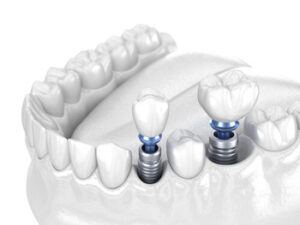Dental implants are now an attractive option for those looking to replace missing teeth. However, when opting for a dental implant, Vietnam may not always be the same as Australia.
This article delves into the nuances of dental implant surgery in Vietnam versus Australia, shedding light on the importance of understanding local regulations, treatment options, and the crucial role of dental expertise in ensuring successful outcomes.
Getting A High-Quality Dental Implant: Vietnam Vs. Australia
Many patients consider travelling overseas for dental treatments, often motivated by the promise of lower costs. Dental tourism has gained traction as patients seek affordable options, with countries like Vietnam becoming popular destinations for dental procedures.
However, this frequently misses the quality and precautionary requirements maintained by Australian dental clinics and enforced by the Australian Health Practitioner Regulation Agency (AHPRA).
Understanding AHPRA And Its Role

While the allure of lower dental implant costs in Vietnam may seem appealing, it’s essential to recognise that treatments in Australia are designed to prioritise patient safety and satisfaction.
The Reality Of Dental Implant Costs In Australia
Many patients may assume that dental treatments, including dental implants, are out of reach due to perceived high costs. However, Australian dental clinics often provide flexible payment plans and accept various insurance options.
Understanding the initial dental implant cost and potential hidden costs associated with overseas treatments can significantly impact decision-making.
How To Know You Need Implant Dentistry Solutions
Understanding the signs indicating a need for dental implants can help you take proactive steps to restore your smile. Here are some common indicators:
Bone Atrophy
When a tooth is lost, the underlying jawbone may degenerate owing to a lack of stimulation. This bone atrophy might result in an alteration in facial structure and additional dental issues. Dental implants can help protect the jawbone from further degeneration.
Teeth Destabilisation
Missing teeth often cause adjacent teeth to shift, leading to misalignment and bite issues. This destabilisation can impact oral function and appearance. Dental implants act as a replacement root, maintaining the position of surrounding teeth and supporting overall dental structure.
Denture Stabilisation
For those who currently wear dentures, dental implants can provide added stability. Implants can anchor dentures in place, reducing movement and discomfort while improving chewing efficiency. This stabilisation can significantly enhance the overall quality of life for denture wearers.
Root Canal Ineligible
Extraction may be required if a tooth is too impaired or decayed to be saved through root canal treatment. In such cases, dental implants can serve as an effective solution to replace the lost tooth while maintaining oral health and function.
Common Types Of Dental Implant Treatments
Before placing dental implants, it’s essential to understand the different types available, as each serves specific needs and circumstances. Here’s an overview of the primary types of dental implants and their unique benefits.
Single Dental Implants
Single dental implants are meant to take the place of a single missing tooth. Below are the merits of single dental implants.
Benefits Of Single-Tooth Implants
One significant advantage of single dental implants is their natural appearance. The crown is meticulously designed to blend seamlessly with your existing teeth, ensuring a cohesive look.
Furthermore, single implants play a crucial role in preserving bone structure. When a tooth is lost, the jawbone beneath can begin to deteriorate. However, single implants help prevent this bone atrophy by integrating with the jawbone.
Functionally, single dental implants restore the ability to chew and speak normally, significantly improving one’s quality of life. Additionally, with proper care and maintenance, single dental implants can last for many years—often decades—making them a long-term investment in one’s oral health.
Mini Dental Implants
Mini implants are smaller in size than standard implants. They are also less intrusive, requiring less surgical intervention. Here are common benefits of mini dental implants.
Benefits Of Mini Dental Implants
The primary benefit of mini dental implants is their adaptability to smaller spaces. They are particularly advantageous for patients who may not qualify for standard implants due to insufficient jawbone width. The placement of mini implants is typically quicker and entails less trauma to the surrounding tissues, allowing for faster healing and less discomfort.
Moreover, mini implants can be a cost-effective solution for those seeking tooth replacement. Their lower initial dental implant cost can make them an appealing option for individuals looking to restore their smiles without significant financial strain.
Implant-Supported Dentures
Implant-supported dentures utilise multiple dental implants to securely hold a full or partial denture in place. Here’s how implant-supported dentures can be of help.
Benefits Of Implant-Supported Dentures

Additionally, similar to single implants, implant-supported dentures contribute to bone preservation. By stimulating the jawbone during regular use, these implants help maintain jawbone density, mitigating the risk of deterioration associated with missing teeth.
Furthermore, depending on patient preference and lifestyle, implant-supported dentures can be designed to be removable for simple cleaning or fixed for a more permanent solution.
The Step-By-Step Dental Implant Procedure In Australia
The dental implant procedure in Australia is well-structured and typically involves several stages to ensure optimal results. Understanding each step can help alleviate any apprehensions and prepare you for what to expect during your dental journey. Below is an overview of the procedure.
Step 1: Initial Consultation
The journey begins with a consultation at an Australian dental clinic. During this visit, your dental expert will evaluate your oral health, take X-rays, and discuss your medical history to determine if you are a suitable candidate for dental implants.
This step is essential for creating a personalised treatment plan tailored to your needs. Your dental expert will also explain the different types of implants available and outline the associated costs.
Step 2: Treatment Planning
Once you are believed to be a suitable candidate, our dentist will develop a detailed treatment plan. This plan outlines the number of implants required, the type of implants to be used, and the overall timeline for the procedure. Additional procedures, like bone grafting, may be brought to the table to ensure adequate bone structure to support the implants.
Step 3: Implant Placement
The next step is the surgical placement of the dental implants. This procedure is typically completed under local anaesthesia, ensuring that you remain comfortable throughout the process.
The dental expert will make a tiny hole in the gum to reach the jawbone, where the titanium implant will be placed. The dental implant functions as a replacement tooth root for the missing tooth. After the implant is securely positioned, the gum tissue is sutured back, and the healing begins.
Step 4: Osseointegration
Following implant placement, a crucial healing phase known as osseointegration occurs. The titanium implant gradually fuses with the jawbone during this period, which usually lasts several months.
This integration is necessary for the long-term success of the implant, providing a sturdy foundation for the replacement tooth. Your dental expert will schedule follow-up appointments to monitor the healing process and ensure that everything progresses well.
Step 5: Abutment Placement
Once osseointegration is complete, a minor surgical procedure attaches an abutment to the implant post. The abutment is a small connector that will hold the dental crown (the visible part of the implant) in place.
This procedure may involve another incision in the gum tissue, but it is typically straightforward and can be done under local anaesthesia. After the abutment is placed, a short healing period is required for the gums to recover.
Step 6: Crown Fabrication
After the gums around the abutment have recovered, impressions of your mouth will be taken to produce a custom-made crown. The crown should match the shape, size, and colour of your natural teeth, ensuring a smooth and aesthetic result. This step involves collaboration with a dental laboratory to fabricate the crown based on your dentist’s specifications.
Step 7: Crown Placement
Once the crown is ready, you will return to the clinic for the final placement. Your dental expert will ensure that the crown fits comfortably and securely onto the abutment and make any necessary adjustments to achieve an optimal bite and appearance. With the crown in place, your dental implant is now complete!
Step 8: Post-Operative Care And Follow-Up
After completing your dental implant procedure, your dentist will provide specific post-operative care instructions. These instructions are essential for promoting healing and ensuring the long-term success of your implants.
Follow-up visits will be set up. when needed, to track your progress and address any enquiries or concerns that may arise. Your dental expert will also emphasise the importance of maintaining good oral hygiene to keep your implants in excellent condition.
Why Choosing A Dental Expert Matters
When considering dental implants, the expertise of your dental practitioner is crucial to getting successful dental implant treatments. Selecting an experienced and skilled dental professional can significantly influence not only the outcome of the dental implant procedure but also your overall experience as a patient.
The Risks Of Cutting Costs
While opting for low-cost dental implants in Vietnam may initially appear appealing, it is vital to weigh the potential risks and complications associated with such choices:
Infection
One of the most significant concerns with dental implant procedures performed in environments that do not adhere to stringent sterilisation protocols is the heightened risk of post-operative infections. Infections may lead to issues that may require additional treatments, further delaying your recovery and incurring unexpected costs.
Implant Failure
The quality of the dental implant treatment is paramount. Poorly executed procedures can result in implant failure, where the implant does not successfully integrate with the jawbone. This necessitates corrective treatments and can be disheartening for patients pursuing a long-term solution to missing teeth.
Lack Of Follow-Up Care
Dental tourism often lacks the necessary follow-up care and ongoing support that local clinics provide. Aftercare is essential for monitoring the healing process and addressing any potential complications. Without proper follow-up, patients risk jeopardising their healing and the overall success of the implant.
Dental Implants Vs. Alternative Dental Treatments
When considering options for replacing missing teeth, understanding the differences between dental implants, dentures, and dental bridges is essential. While each solution has benefits, dental implants stand out for their quality, longevity, and cost-effectiveness.
Dental Implants
Dental implants are often hailed as a fine standard in tooth replacement options. Below are key points highlighting the quality, lifespan, and long-term cost reduction associated with dental implants:
Quality
Dental implants are anchored directly into the jawbone, providing a sturdy and stable foundation that mimics the function of natural teeth. This integration promotes better oral health by preventing bone atrophy, a common issue associated with tooth loss.
Lifespan
With proper care, dental implants can last a lifetime, making them a durable choice for tooth replacement. The high success rate of around 95% reflects their reliability and effectiveness.
Long-Term Cost Reduction
Although dental implants may initially cost more than other options, their longevity means they are often more cost-effective. With fewer replacements and repairs required over time, patients can save significantly on dental expenses.
Dentures
Dentures offer a flexible solution for replacing multiple missing teeth. The following points outline the quality, lifespan, and long-term cost considerations associated with dentures:
Quality
Dentures are removable appliances that can replace multiple missing teeth. While they restore function and aesthetics, they may not offer the same stability as implants. Dentures can shift or slip, causing discomfort and making eating and speaking more challenging.
Lifespan
Dentures must be replaced every few years due to wear and changes in the mouth’s structure. This need for frequent replacement can lead to higher costs over time.
Long-Term Cost Consideration
Although the upfront cost of dentures is generally lower, the ongoing expenses associated with replacements, adjustments, and necessary adhesives can accumulate, potentially outweighing the initial savings.
Dental Bridges
Dental bridges are designed to fill the gap left by one or more missing teeth by anchoring them to adjacent healthy teeth. While they can be beneficial, they do come with certain drawbacks. Here’s a closer look at the quality, lifespan, and long-term cost implications of dental bridges:
Quality
Dental bridges involve anchoring a false tooth (pontic) to adjacent healthy teeth. While they can effectively restore function and aesthetics, they require altering surrounding teeth, which can compromise their health over time.
Lifespan
Bridges usually last several years, depending on oral hygiene and care. However, the adjacent teeth may still face issues, leading to the possibility of additional treatments.
Long-Term Cost Implications
Similar to dentures, the cost of bridges may be lower initially, but the need for maintenance, replacements, and potential issues with adjacent teeth can result in higher overall costs.
Frequently Asked Questions
What are dental implants?
Dental implants are artificial tooth roots, typically made of titanium, surgically placed in the jawbone to support replacement teeth.
How much do dental implants cost in Australia?
The cost of dental implants may change based on several aspects, including the complexity of the procedure, the type of implant used, and the specific dental clinic. Many clinics offer payment plans and insurance options to help manage costs.
What is the recovery process like after dental implant surgery?
Recovery varies by individual, but most patients should expect swelling and discomfort in the first few days. To promote healing, it’s crucial to follow post-operative care instructions, which may include pain management and dietary adjustments.
What should I do if I experience discomfort after dental implant surgery?
Some discomfort after surgery is normal, but if it becomes severe or persists, it’s essential to contact your dentist. They can evaluate your situation and guide you in managing any complications.
Choosing The Right Solution For Your Smile

Explore the range of dental implant options available in Australia, take advantage of flexible payment plans, and consult with experienced Australian dental practitioners.
Taking care of dental health is an investment in overall well-being, and with the right information, you can feel confident and excited about your journey towards a healthier smile.
Don’t let missing teeth hold you back any longer! If you’re considering dental implants or simply want to learn more about your options, our experienced team serving Elanora and Coorparoo is here to help.
Call Complete Dental today at 07 5235 8199 or 07 3801 6503 to book an appointment. Let’s work together to restore your confidence and beautiful smile!
Note: Any surgical or invasive procedure carries risks. Before proceeding, you should seek a second opinion from an appropriately qualified health practitioner.
Sources:
Policies, Codes, Guidelines and FAQ [Internet]. Dental Board AHPRA. 2022 [cited 2024 Sep 26]. Available from: https://www.dentalboard.gov.au/Codes-Guidelines.aspx
Larson J. Should You Opt for a Root Canal or an Extraction and Implant? [Internet]. Healthline. 2022 [cited 2024 Sep 26]. Available from: https://www.healthline.com/health/dental-and-oral-health/root-canal-vs-implant
Veronika. Types of Dental Implants & How They Work [Internet]. NewMouth. 2024 [cited 2024 Sep 26]. Available from: https://www.newmouth.com/dentistry/restorative/implants/
Mayo Clinic Staff. Dental Implant Surgery [Internet]. Mayo Clinic. 2019 [cited 2024 Sep 26]. Available from: https://www.mayoclinic.org/tests-procedures/dental-implant-surgery/about/pac-20384622
Bell A. What Problems Can Occur After Dental Implant Surgery? [Internet]. Medical News Today. 2023 [cited 2024 Sep 26]. Available from: https://www.medicalnewstoday.com/articles/dental-implants-problems
Dutta SR, Passi D, Singh P, Atri M, Mohan S, Sharma A. Risks and Complications Associated With Dental Implant Failure: Critical Update. National Journal of Maxillofacial Surgery [Internet] 2020;11:14. Available from: https://journals.lww.com/njms/fulltext/2020/11010/risks_and_complications_associated_with_dental.4.aspx
Colgate®. Bridge Or Implant: Which Is Best For You? [Internet]. Colgate®. 2023 [cited 2024 Sep 26]. Available from: https://www.colgate.com/en-us/oral-health/implants/bridge-or-implant-which-is-best









